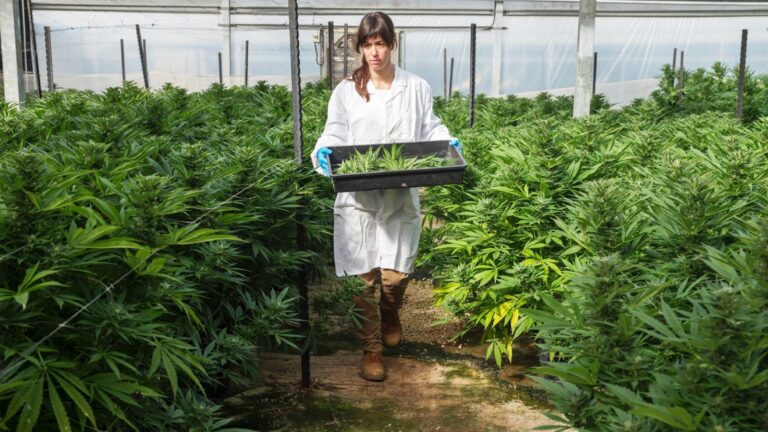
Not long before flower children of the Sixties started talking peace and love and smoking pot, an Israeli researcher made a landmark study deciphering the chemical makeup of its active ingredient, THC.
Using an 11-pound lump of Lebanese hash seized by the national police, Raphael Mechoulam identified and synthesized the first known cannabinoid from cannabis, among an estimated 60 to 85 known compounds. He’d go on to discover more.
Mechoulam, 85, is still an active researcher on the chemistry of cannabis, and his work has given the Israeli establishment a positive and progressive view on the way cannabis can be researched, cultivated and applied.
An estimated 10 academic teams in Israel currently research medicinal uses for cannabis, and several commercial ventures have sprung from this, as ISRAEL21c has reported.
Cannabis is found to both alleviate symptoms and treat chronic conditions including Parkinson’s disease and cancer. It is shown to reduce depression and even slow down the incidence of epileptic seizures.
Now with America’s belt of marijuana legislation loosening and the stigma of “using” being lifted, Israeli research and development in traditional areas like agriculture technologies are crystallizing into new market areas for cannabis.
Israel’s agtech rolling to pot
Israel is considered a world leader in agtech developments, such as seed breeding, precision agriculture, natural pesticides, water saving through drip irrigation, and hydroponics. It makes sense that agtech companies in this environment are emerging to take a serious look at pot.
And the timing couldn’t be better, as America’s cannabis business could be the next gold rush. Officially worth some $2 billion this year, the sector is estimated to be worth up to $150 billion taking into account underground activities. A reported 78 percent of Americans support access to medical cannabis.
About half all US states allow marijuana in some form, whether by permit for medical reasons or recreationally. If legalized nationally, the cannabis business could grow to $40 billion in taxable sales per year by 2020 — more than the wine market. The US Congress recently decided in a landmark decision that individual states can determine their own policies on hemp and cannabis.
Companies match American interest
The same technologies developed for increasing food yield and farming productivity can be applied to cultivating medical cannabis, says Yaniv Kitron, CEO of Eden Shield, which is developing a natural insect repellent.
He’s learned that while conventional farmers might be hesitant to try a new organic pesticide, the cannabis industry is bursting with interest — and in some cases, investment money.
Lenore Shoham, vice president of new ventures at Israel’s Trendlines, represents the incubator fund that invested in EdenShield. While unproven, cannabis is an interesting and new go-to market for traditional agtech companies from Israel, she tells ISRAEL21c.
“We are seeing a lot of interest from our investors in cannabis,” she says. “It’s a way for young companies to get their initial funding, which paves the way to later additional applications.”
The majority of Trendlines investment money per company (about $500,000) comes from Israel’s Office of the Chief Scientist. A smaller portion is kicked in from private investors.
“While we haven’t yet submitted any projects to the government which are from the start focused on cannabis, we are not seeing any objections to projects in collaboration with cannabis companies,” Shoham notes.
Some Israeli companies have moved into the market. In Canada, MedReleaf, a large federally approved medical cannabis producer, has secured IP and cannabis clones developed by Tikun Olam, Israel’s first grower of medical cannabis. MedReleaf has a license for use in New York State.
BreedIT, also developed in Israel, is an enterprise solution that helps seed breeders plan, manage and analyze seed-breeding data.
Seed breeding is an essential aspect of the cannabis business, giving one grower the market edge over another. But breeding seeds so they are reliable and their product replicable is a much-sought standard in the medical community as well.
Companies involved in medical marijuana cultivation were featured at Canna Tech, Israel’s first medical cannabis technologies conference. A crowd of investors, entrepreneurs, local growers, and media came to see the movers and shakers of Israel’s blossoming marijuana market.
As Israeli legislation moves toward full legalization, every company connected to the business took part in the event, if only for the chance to network among venture capitalists, food industry giants and scientists from prestigious agriculture R&D centers like the Volcani Institute.
American interest in techniques and products for cannabis growing and medical marijuana delivery is sure to bring many Israeli advances to the forefront of the market in coming years.


















